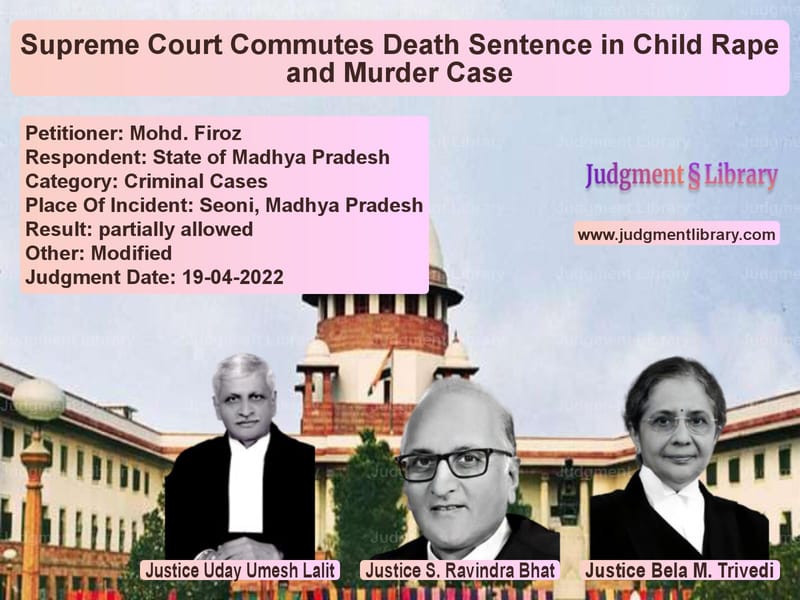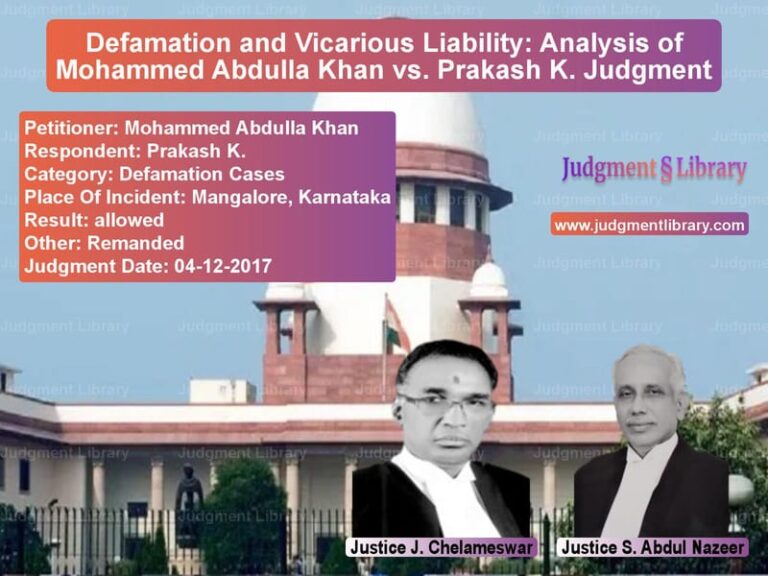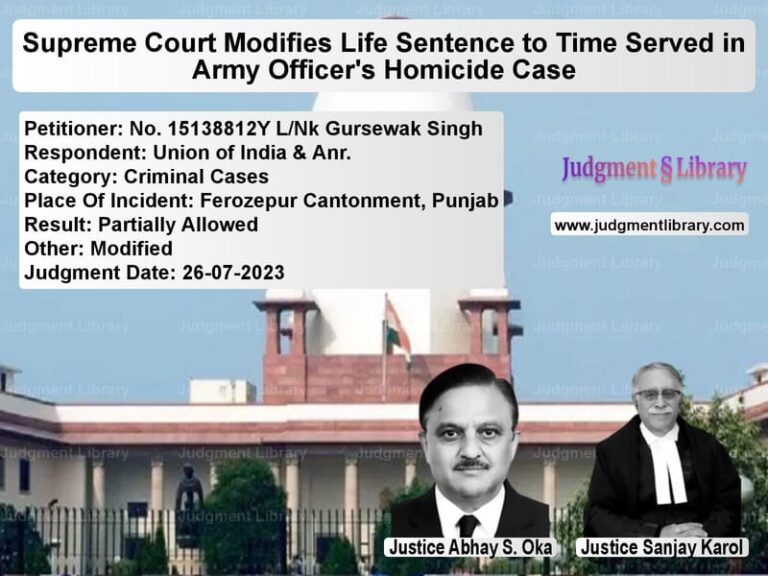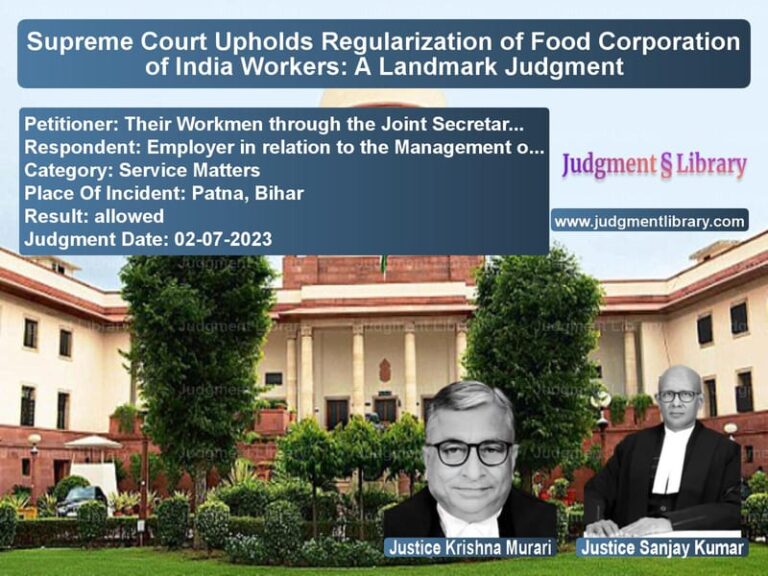Supreme Court Commutes Death Sentence in Child Rape and Murder Case
The Supreme Court of India has commuted the death sentence awarded to Mohd. Firoz, who was convicted for the rape and murder of a four-year-old girl in Madhya Pradesh. The Court upheld his conviction but modified his punishment to life imprisonment for twenty years instead of the death penalty.
Background of the Case
The case pertains to the abduction, sexual assault, and brutal murder of a minor girl in the Seoni district, Madhya Pradesh. On April 17, 2013, the accused, Mohd. Firoz, along with his accomplice Rakesh Choudhary, visited the house of the victim under the pretense of seeking shelter for the night. The victim, a four-year-old girl, was playing outside when Firoz abducted her. The next morning, she was found unconscious in a field, severely injured and bleeding. She was taken to multiple hospitals but succumbed to her injuries on April 29, 2013.
Charges and Trial
The trial court convicted Mohd. Firoz under multiple sections of the Indian Penal Code (IPC) and the Protection of Children from Sexual Offences (POCSO) Act, awarding him the death penalty. His accomplice, Rakesh Choudhary, was convicted under lesser charges but was later acquitted by the Madhya Pradesh High Court.
Convictions and Sentences
| Charge | Sentence |
|---|---|
| Section 302 IPC (Murder) | Death Sentence (later commuted to life imprisonment for 20 years) |
| Section 376(2)(i) & 376(2)(m) IPC (Aggravated Sexual Assault) | Life Imprisonment |
| Section 363 IPC (Kidnapping) | 7 Years RI & ₹2000 Fine |
| Section 366 IPC (Kidnapping with Intent to Rape) | 10 Years RI & ₹2000 Fine |
| Section 5(i) & 5(m) r/w Section 6 POCSO Act | Life Imprisonment |
Arguments of the Petitioner (Mohd. Firoz)
- His counsel argued that the conviction was based entirely on circumstantial evidence and there were inconsistencies in witness testimonies.
- He contended that there was no direct evidence linking him to the crime.
- His legal team claimed that his trial was conducted in a manner that was unfair and biased due to media pressure.
- He argued that the death penalty was disproportionate and should be commuted to life imprisonment.
Arguments of the Respondent (State of Madhya Pradesh)
- The prosecution presented forensic evidence linking the accused to the crime scene.
- Multiple witnesses confirmed that the victim was last seen with the accused.
- The state highlighted the brutality of the crime, arguing that it met the criteria for the “rarest of rare” case.
- The prosecution contended that the accused had absconded after the crime, which indicated his guilt.
Supreme Court’s Ruling
The Supreme Court bench comprising Justices Uday Umesh Lalit, S. Ravindra Bhat, and Bela M. Trivedi upheld the conviction but commuted the death sentence.
1. Circumstantial Evidence and Conviction
The Court ruled that the prosecution had established a strong chain of circumstantial evidence proving the accused’s guilt.
“The accused was last seen with the victim, forensic evidence linked him to the crime scene, and his conduct after the incident reinforced his guilt.”
2. Application of the “Rarest of Rare” Doctrine
While acknowledging the heinous nature of the crime, the Court held that the case did not meet the threshold for the death penalty.
“The death penalty should be reserved for cases where there is no possibility of rehabilitation.”
3. Fair Trial Considerations
The Court rejected the claim that the trial was unfair due to media pressure, stating:
“There is no evidence to suggest that the accused was denied due process or that the trial was compromised.”
4. Commutation of Sentence
The Court ruled that instead of the death penalty, the accused would serve 20 years of rigorous imprisonment for the offense under Section 376A IPC.
Final Judgment
- The Supreme Court commuted the death penalty to life imprisonment for 20 years.
- The convictions under IPC and POCSO Act were upheld.
- The sentence for other charges remained unchanged.
- The acquittal of Rakesh Choudhary was not challenged and remained final.
Impact of the Judgment
- Establishes that even in heinous crimes, the death penalty should be imposed only in the rarest of rare cases.
- Reinforces the principle that circumstantial evidence must be strong to uphold a conviction.
- Recognizes the balance between retributive and restorative justice.
Conclusion
The Supreme Court’s ruling in Mohd. Firoz vs. State of Madhya Pradesh underscores the need for fairness and due process even in the most serious of cases. By commuting the death sentence to life imprisonment, the Court has upheld the constitutional principles guiding criminal justice while ensuring that the convict remains behind bars for a substantial period.
Petitioner Name: Mohd. Firoz.Respondent Name: State of Madhya Pradesh.Judgment By: Justice Uday Umesh Lalit, Justice S. Ravindra Bhat, Justice Bela M. Trivedi.Place Of Incident: Seoni, Madhya Pradesh.Judgment Date: 19-04-2022.
Don’t miss out on the full details! Download the complete judgment in PDF format below and gain valuable insights instantly!
Download Judgment: mohd.-firoz-vs-state-of-madhya-prad-supreme-court-of-india-judgment-dated-19-04-2022.pdf
Directly Download Judgment: Directly download this Judgment
See all petitions in Murder Cases
See all petitions in Bail and Anticipatory Bail
See all petitions in Juvenile Justice
See all petitions in Judgment by Uday Umesh Lalit
See all petitions in Judgment by S Ravindra Bhat
See all petitions in Judgment by Bela M. Trivedi
See all petitions in partially allowed
See all petitions in Modified
See all petitions in supreme court of India judgments April 2022
See all petitions in 2022 judgments
See all posts in Criminal Cases Category
See all allowed petitions in Criminal Cases Category
See all Dismissed petitions in Criminal Cases Category
See all partially allowed petitions in Criminal Cases Category







